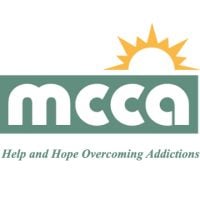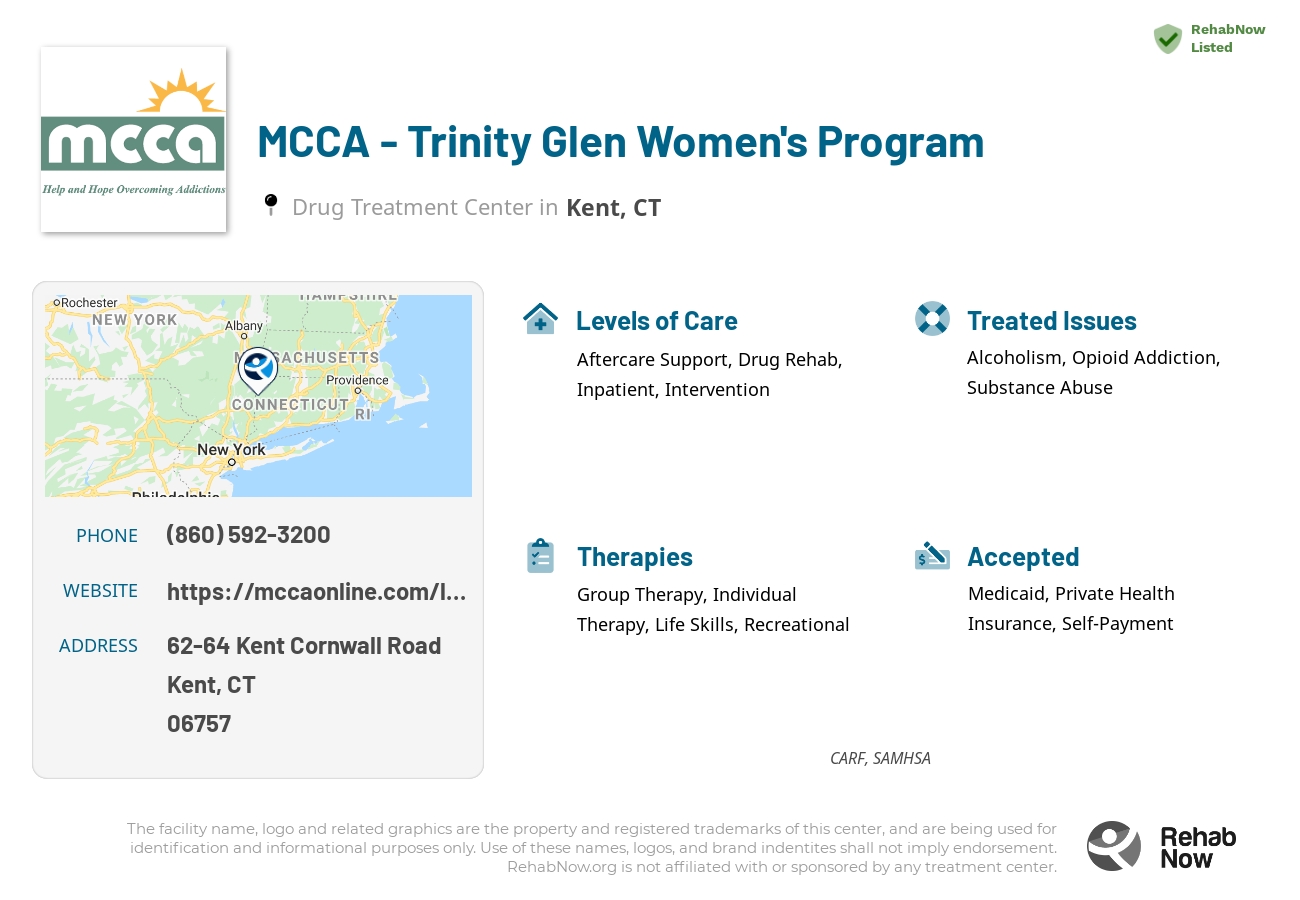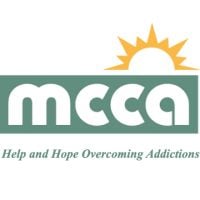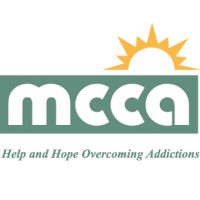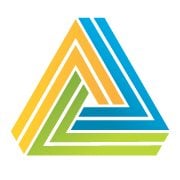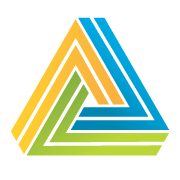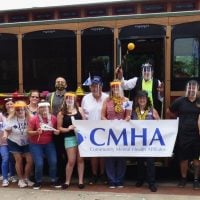MCCA - Trinity Glen Women's Program
Drug Rehab Center in Kent, Connecticut
The MCCA - Trinity Glen Women's Program in Kent, Connecticut is an addiction treatment facility that offers comprehensive services for individuals suffering from various addictions and mental health issues, with specialized staff and a range of treatment options provided in a safe and supportive environment.
About MCCA - Trinity Glen Women's Program in Connecticut
Nestled in the picturesque hills of Kent, Connecticut, Trinity Glen Women's Program stands out as a focused drug and alcohol rehab center specifically for women. This facility offers 11 semi-private dormitory rooms, fostering a supportive environment with spacious living and meeting areas. It's uniquely tailored to address the challenges faced by women suffering from chronic addiction, providing comprehensive and effective treatment options.
Trinity Glen Women's Program is fully accredited by CARF, ensuring that the highest standards of care and treatment are met. Recognized for their professional detoxification services, this facility helps women withdraw safely from substances under expert medical supervision. Additionally, their residential treatment and transitional living options prepare women for successful reintegration into society.
- Professional Detoxification Services: Designed to ensure a safe and comfortable withdrawal process under medical supervision.
- Evidence-Based Therapies: Offers individual counseling, group support, and a variety of therapeutic activities.
- Transitional Living Options: Halfway houses provide a supportive step towards independent living, facilitating a smoother transition from treatment to community reintegration.
At Trinity Glen Women's Program, specific addictions treated include alcoholism, opioid addiction, substance abuse, and drug addiction, along with services for mental health and dual diagnosis. Their treatment approach incorporates a mix of interventions, inpatient treatment, detoxification, and outpatient services, aligned to meet the individual needs of each woman in their journey to recovery.
Genders
Ages
Modality
Additional
Accreditations
SAMHSA

CARF
The Commission on Accreditation of Rehabilitation Facilities (CARF) is a non-profit organization that specifically accredits rehab organizations. Founded in 1966, CARF's, mission is to help service providers like rehab facilities maintain high standards of care.
Conditions and Issues Treated
Substance abuse creates problems that affect people in Kent, CT on many levels. First, substance abuse affects the individual who is abusing drugs or alcohol. This can result in health problems, including heart damage and overdose. Substance abuse also affects the user’s family, friends, co-workers, classmates, or peers. These people feel frustrated because they do not know how to help their loved ones struggling with addiction. At the same time, the addict cannot control his behavior. Lastly, friends and family members of addicts are affected financially by substance abuse.
The good news is that effective treatments can help prevent substance abuse or treat its effects on the user. These treatments, which include behavioral therapy and counseling sessions, target the underlying causes of substance abuse, helping users achieve sobriety so they can regain control over their lives. They also teach users to cope with stress in ways other than using drugs or alcohol.
Opioid addiction has become a significant health problem in the United States. When a person’s life becomes unmanageable because of an opioid addiction, treatment can help them get sober. Treatment includes medical care and counseling.
“With so many people struggling with opioid addiction, we need more care and attention for those who want to quit. Opioid addicts often take opioids when they experience a painful injury – that’s how the cycle starts! When someone begins taking their medication differently than prescribed or takes an excessive amount of drugs, it means they’re hooked on drugs and in danger of overdosing.
The most successful way to beat this is through detoxing from these types treatments at MCCA - Trinity Glen Women's Program in . Most facilities start by using medical support during the process while providing counseling services; rehabilitation comes later on after treatment has been completed successfully.
Levels of Care Offered
This center offers a variety of custom treatment tailored to individual recovery. Currently available are Aftercare Support, Drug Rehab, Inpatient, Intervention, with additional therapies available as listed below.
Going to an inpatient rehab facility means living there while all aspects of addiction or co-occurring disorder get addressed. The treatment involves medical supervision, therapy, and future planning.
This type of rehabilitation provides a drug-free environment for people who struggle with chronic/long-term addiction without having access to drugs outside the center (or their own home). It takes away any distractions because they live there 24 hours per day. If someone is trying to break out old habits, which could lead them back into substance abuse, things like jobs or school can be put on hold until after they complete their stay to focus solely on recovery.
Interventionism is a technique used to help an addict get clean and sober. The process begins with the addict’s family, friends, and co-workers gathering together to confront the addict about their addiction. This often happens when the addict is in the middle of a particularly bad bout of drug abuse.
The addict’s friends and family members are encouraged to share their feelings about the addict’s behavior with them, as well as what it’s doing to the addict and their loved ones. At first, the addict is typically resistant to this form of treatment because they feel it’s an intrusion on their private life. They may be upset or even angry at the interventionist for orchestrating this meeting. Over time, though, most addicts come to understand that their loved ones are only trying to help them.
During the intervention, the addict’s family and friends are encouraged to tell the addict how their drug use has affected their lives. The interventionist is there to help everyone organize their thoughts and communicate their message. They also help to ensure that the conversation doesn’t become aggressive or combative, which could put the addict on the defensive and make them reject the intervention.
This kind of treatment aims to get the addict in touch with their feelings about their addiction. They are encouraged to speak honestly about their drug use, as well as how it’s making them feel. They’re also asked to consider the consequences of their drug use and how it’s hurting their loved ones. The addict is allowed to see how their addiction has become a problem for everyone around them.
Without aftercare support, addicts can easily relapse back into addiction. It is crucial to integrate the addict back into society. Aftercare support should take place after outpatient treatment has ended.
There are a few different types of aftercare support that patients can seek after completing an inpatient treatment program:
- 12 Step Self-help groups (AA, NA)
- Therapeutic communities,
- Long-term, structured sober living arrangements
- Halfway houses (residential treatment centers)
Many different support groups exist for addicts to seek help after treatment. Some are more effective than others, depending on the person’s addiction, background, and other factors.
Therapies & Programs
Individual therapy is a form of counseling where you meet with a trained professional one-on-one. Meeting with a therapist in this setting allows for a personal and trusting relationship to be built. This allows the patient to open up about sensitive or private issues they may not feel comfortable discussing in a group. Individual therapy helps identify the root causes of your addiction, which can help prevent relapse.
Group therapy sessions are another common addiction recovery service. These group sessions typically involve six to 12 addicts who meet regularly with a trained professional for support and guidance.
During these sessions, the group shares their experiences with one another and provides feedback that can help each member avoid relapse or overcome specific obstacles they are facing in their recovery process. With this type of support and guidance, addicts can feel like they are part of a community that understands their struggles and will help them get through the hard times.
It’s not as simple as quitting drinking or using drugs and expecting the hard part to be over. Many addicts in recovery have discovered that they need to improve skills such as time management, organization, communication, socialization, and self-esteem. Learning certain life skills can help those who are struggling with addiction.
Payment Options Accepted
For specific insurance or payment methods please contact us.
Is your insurance accepted?
Ask an expert, call (888) 674-0062
Midwestern Connecticut Council on Alcoholism Associated Centers
Discover treatment facilities under the same provider.
- MCCA McDonough House and Detox - Danbury in Danbury, CT
- MCCA - New Haven Clinic in New Haven, CT
- MCCA Danbury Outpatient Clinic in Danbury, CT
- MCCA Derby Outpatient Clinic in Derby, CT
- Midwestern Connecticut Council on Alcoholism - Bridgeport in Bridgeport, CT
Learn More About Midwestern Connecticut Council on Alcoholism Centers
Additional Details
Specifics, location, and helpful extra information.
Kent, Connecticut 6757 Phone Number(860) 592-3200 Meta DetailsUpdated April 15, 2024
Staff Verified
MCCA - Trinity Glen Women's Program Patient Reviews
There are no reviews yet. Be the first one to write one.
Kent, Connecticut Addiction Information
Connecticut has a higher rate of substance abuse and addiction than the national average. The state ranks in the top 10 in the country for illicit drug dependence among those ages 18 to 25. In 2010, there were 9,211 people admitted to an alcohol treatment facility for alcohol abuse combined with a secondary drug. Connecticut ranked fifth in the United States of America for the number of fatalities involving drunk driving in 2014.
Treatment in Nearby Cities
- Mansfield Center, CT (65.3 mi.)
- Norwalk, CT (43.1 mi.)
- New Canaan, CT (41.1 mi.)
- Chicopee, CT (52.3 mi.)
- Groton, CT (76.6 mi.)
Centers near MCCA - Trinity Glen Women's Program
The facility name, logo and brand are the property and registered trademarks of MCCA - Trinity Glen Women's Program, and are being used for identification and informational purposes only. Use of these names, logos and brands shall not imply endorsement. RehabNow.org is not affiliated with or sponsored by MCCA - Trinity Glen Women's Program.
